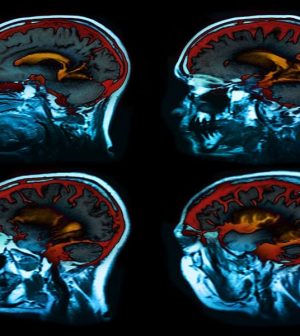- Could Your Grocery Store Meat Be Causing Recurring UTIs?
- Are You Making This Expensive Thermostat Error This Winter?
- Recognizing the Signs of Hypothyroidism
- 10 Strategies to Overcome Insomnia
- Could Artificial Sweeteners Be Aging the Brain Faster?
- Techniques for Soothing Your Nervous System
- Does the Water in Your House Smell Funny? Here’s Why
- Can a Daily Dose of Apple Cider Vinegar Actually Aid Weight Loss?
- 6 Health Beverages That Can Actually Spike Your Blood Sugar
- Treatment Options for Social Anxiety Disorder
Study Finds Some Patients With A-Fib Have Hidden Brain Damage

In a new study of patients with the heart rhythm disorder atrial fibrillation (a-fib), 4 in 10 had previously undetected brain damage, though none had a history of stroke or mini-stroke.
This brain damage could put them at risk for mental decline and dementia, researchers said.
Their study included nearly 1,400 patients in Switzerland, average age 72, who had atrial fibrillation and underwent MRI brain scans. None had suffered a stroke or mini-stroke (transient ischemic attack — TIA).
Forty-one percent had at least one type of previously unknown brain damage. Of these, 15 percent had a cerebral infarct, which is an area of dead tissue in the brain; 19 percent had small bleeds in the brain (microbleeds); and 16 percent had small deep brain lesions called lacunes.
The study was presented Sunday at a European Society of Cardiology meeting, in Munich, Germany. Research presented at meetings is considered preliminary until published in a peer-reviewed journal.
“Four in 10 patients with atrial fibrillation but no history of stroke or transient ischemic attack had clinically unrecognized ‘silent’ brain lesions,” co-principal investigator Dr. David Conen said in a society news release. He is an associate professor of medicine at McMaster University in Ontario, Canada.
“This brain damage could trigger cognitive decline,” Conen added.
People with atrial fibrillation have significantly higher odds of stroke, and most are treated with blood thinners to reduce this risk. This increased stroke risk is probably the main reason why patients with atrial fibrillation also have an increased risk of mental decline and dementia.
However, a link between atrial fibrillation and dementia has also been found in atrial fibrillation patients without prior strokes, meaning that other factors may play a role.
Learning more about how atrial fibrillation increases the risk of mental (cognitive) decline and dementia could help identify preventive measures.
All of the patients in the study had extensive cognitive testing. The results will be analyzed to determine if those with “silent” brain damage have mental decline, Conen said.
More information
The U.S. National Heart, Lung, and Blood Institute has more on atrial fibrillation.
Source: HealthDay
Copyright © 2026 HealthDay. All rights reserved.










